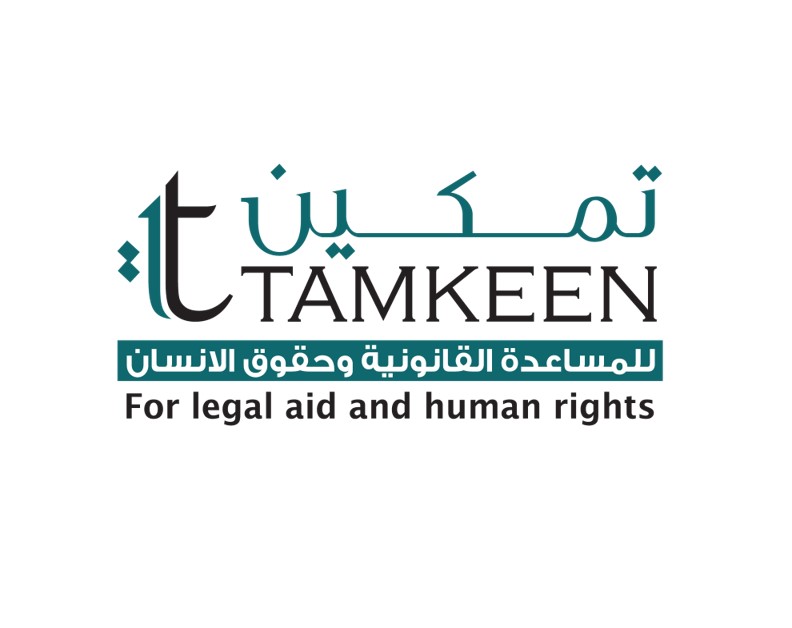
 2020-04-05
2020-04-05
Under Curfew: Tamkeen reveals the status of Migrants in the midst of the Corona Virus Crisis and the difficulties they are facing
Amman- Following the curfew decision that was announced on 21/3/2020 by the Jordanian government to curtail the spread of the corona virus, Migrant Workers in Jordan find themselves in a difficult situation as their income has stopped and are thus unable to secure their livelihood.
Recently, Tamkeen for Legal Aid and Human Rights has published a report on the status of these workers, covering the period between March 18th and April 2nd, 2020.
The report fleshed out the status of these workers, following a monitoring process that included conducting phone interviews and communication with workers, through the organisation’s Social Media platforms.
Through these communications, Tamkeen noted some positive aspects, as well as a number of issues. First, Tamkeen noted that there have been no reports of deportation or administrative detention of workers throughout this period, for possible violations of the Residency and Foreign Affairs Law or the Labour Law.
Moreover, 3 Sri Lankan workers who were quarantined after arriving to the Kingdom reported that they faced no forms of discrimination during those 14 days. The workers confirmed that they were provided individual rooms in the 4- or 5-star hotels that were offered, as well as receiving all the services that were offered from food, drink and health care.
Other categories that the report covered though highlighted their difficult living conditions as a result of the crisis. These included workers in private and public institutions, though not in vital sectors, whether formal and informal. The report highlighted the difficult situation that the curfew has resulted in for employers and workers alike, whether Jordanians or Migrants, both economically and in relation to their living conditions. It especially highlighted the difficulties faced by informal workers, as well as those who hold flexible work permits, in light of the scarcity of solutions offered to protect them in these difficult circumstances.
One of the hardest-hit categories are Egyptian Workers, who represent the highest numbers among Migrant Workers in Jordan. Since they stopped working, these workers are now unable to secure their own personal basic needs, which in turn also meant that they did not send any remittances to their families back in Egypt.
In the report, some of these workers were quoted as admitting that their employer has forced them to return to work despite the curfew. Others said that they were forced to request a wage-less vacation until the Corona pandemic is over, while others said that their employers have delayed paying their salary as a result of the curfew decision.
An Egyptian worker, who operates a stone-cutting saw in the capital, said that he was not paid his wage prior to the curfew taking effect, as the employer said that he did not have enough money at the time. Workers in other sectors reported the same thing, even those who work in sectors that are exempt from the curfew like: grocery stores, bakeries, gas stations and supportive services.
Another issue highlighted by these workers was the stoppage of public transportation, which represented a difficulty on itself for workers who needed to go to work. Thus, these workers were forced to use expensive means of transportation, which exuberated their difficult situation, especially for those who receive a monthly wage that does not exceed 250 JOD. Since some of these workers are informal, they cannot lodge a complaint about such violations to the Ministry of Labour, as they are afraid of the ramifications of them working without a valid permit.
Two such workers told their story in the report. Both men live in Madaba but work in Amman. Despite the curfew, they continued to work for a full week. Indeed, the employer locked them inside the shop for the full work without being provided with sufficient food or even heating. Even though both knew the emergency number, they could not call it as one of them was informal and thus were afraid of the consequences.
The second category highlighted by the report is Domestic Workers. The majority of these workers come from the Philippines, Sri Lanka, and Bangladesh. These workers are under tremendous pressure, whether those who are formal and are thus residing and working inside the house of the employer; or informal workers who cannot work anymore due to the curfew.
Through the phone calls and messages received, formal workers have complained of the bad treatment that they are subjected to during this crisis. They say that their work load has intensified as all family members now remain in the house. Therefore, the working hours of some of these workers could reach to 16 hours a day, without being provided with any holidays or rest.
On the other hand, informal workers report that they are unable to provide for themselves. In fact, more than 600 workers have contacted Tamkeen during this period to report on their inability to secure their livelihoods. Amongst them are 30 mothers who were not able to buy their babies’ needs, while others said that they do not have enough money to pay their rent, and are facing the risk of eviction.
The report also highlights the status of two domestic workers: one Sri Lankan and one Filipina who were infected with the corona virus after getting in contact with two who were already sick. Both of them are now receiving healthcare and are in stable conditions.
The third category covered were Beauty Salon Workers who reported that they did not receive their wages. Therefore, they were neither able to send money back to their families, nor have enough money to pay their rent or secure their own needs. The workers reported that employers refused to pay their wages since they were not working due to the curfew.
These violations are occurring despite the Ministry of Labour saying that employers in the private sector most adhere to paying the wages of their workers for the month of March.
Even though the Ministry have established a method for the receiving of wages through an electronic wallet, workers have said that they are facing difficulties using it. These range from not having phones that are compatible with the wallet; not having an internet connection; or their lack of knowledge about how to use the wallet. Another hurdle is linguistic, as the wallet provides an interface either in Arabic or English, but some of these workers are only fluent in their mother tongue.
The final category are workers in the Qualified Industrial Zones. The report said that the situation of these workers is cloaked in mystery. Even though these workers usually receive their monthly wages at the beginning of the month, they are still struggling to secure their needs due to the curfew.
Amman- Following the curfew decision that was announced on 21/3/2020 by the Jordanian government to curtail the spread of the corona virus, Migrant Workers in Jordan find themselves in a difficult situation as their income has stopped and are thus unable to secure their livelihood.
Recently, Tamkeen for Legal Aid and Human Rights has published a report on the status of these workers, covering the period between March 18th and April 2nd, 2020.
The report fleshed out the status of these workers, following a monitoring process that included conducting phone interviews and communication with workers, through the organisation’s Social Media platforms.
Through these communications, Tamkeen noted some positive aspects, as well as a number of issues. First, Tamkeen noted that there have been no reports of deportation or administrative detention of workers throughout this period, for possible violations of the Residency and Foreign Affairs Law or the Labour Law.
Moreover, 3 Sri Lankan workers who were quarantined after arriving to the Kingdom reported that they faced no forms of discrimination during those 14 days. The workers confirmed that they were provided individual rooms in the 4- or 5-star hotels that were offered, as well as receiving all the services that were offered from food, drink and health care.
Other categories that the report covered though highlighted their difficult living conditions as a result of the crisis. These included workers in private and public institutions, though not in vital sectors, whether formal and informal. The report highlighted the difficult situation that the curfew has resulted in for employers and workers alike, whether Jordanians or Migrants, both economically and in relation to their living conditions. It especially highlighted the difficulties faced by informal workers, as well as those who hold flexible work permits, in light of the scarcity of solutions offered to protect them in these difficult circumstances.
One of the hardest-hit categories are Egyptian Workers, who represent the highest numbers among Migrant Workers in Jordan. Since they stopped working, these workers are now unable to secure their own personal basic needs, which in turn also meant that they did not send any remittances to their families back in Egypt.
In the report, some of these workers were quoted as admitting that their employer has forced them to return to work despite the curfew. Others said that they were forced to request a wage-less vacation until the Corona pandemic is over, while others said that their employers have delayed paying their salary as a result of the curfew decision.
An Egyptian worker, who operates a stone-cutting saw in the capital, said that he was not paid his wage prior to the curfew taking effect, as the employer said that he did not have enough money at the time. Workers in other sectors reported the same thing, even those who work in sectors that are exempt from the curfew like: grocery stores, bakeries, gas stations and supportive services.
Another issue highlighted by these workers was the stoppage of public transportation, which represented a difficulty on itself for workers who needed to go to work. Thus, these workers were forced to use expensive means of transportation, which exuberated their difficult situation, especially for those who receive a monthly wage that does not exceed 250 JOD. Since some of these workers are informal, they cannot lodge a complaint about such violations to the Ministry of Labour, as they are afraid of the ramifications of them working without a valid permit.
Two such workers told their story in the report. Both men live in Madaba but work in Amman. Despite the curfew, they continued to work for a full week. Indeed, the employer locked them inside the shop for the full work without being provided with sufficient food or even heating. Even though both knew the emergency number, they could not call it as one of them was informal and thus were afraid of the consequences.
The second category highlighted by the report is Domestic Workers. The majority of these workers come from the Philippines, Sri Lanka, and Bangladesh. These workers are under tremendous pressure, whether those who are formal and are thus residing and working inside the house of the employer; or informal workers who cannot work anymore due to the curfew.
Through the phone calls and messages received, formal workers have complained of the bad treatment that they are subjected to during this crisis. They say that their work load has intensified as all family members now remain in the house. Therefore, the working hours of some of these workers could reach to 16 hours a day, without being provided with any holidays or rest.
On the other hand, informal workers report that they are unable to provide for themselves. In fact, more than 600 workers have contacted Tamkeen during this period to report on their inability to secure their livelihoods. Amongst them are 30 mothers who were not able to buy their babies’ needs, while others said that they do not have enough money to pay their rent, and are facing the risk of eviction.
The report also highlights the status of two domestic workers: one Sri Lankan and one Filipina who were infected with the corona virus after getting in contact with two who were already sick. Both of them are now receiving healthcare and are in stable conditions.
The third category covered were Beauty Salon Workers who reported that they did not receive their wages. Therefore, they were neither able to send money back to their families, nor have enough money to pay their rent or secure their own needs. The workers reported that employers refused to pay their wages since they were not working due to the curfew.
These violations are occurring despite the Ministry of Labour saying that employers in the private sector most adhere to paying the wages of their workers for the month of March.
Even though the Ministry have established a method for the receiving of wages through an electronic wallet, workers have said that they are facing difficulties using it. These range from not having phones that are compatible with the wallet; not having an internet connection; or their lack of knowledge about how to use the wallet. Another hurdle is linguistic, as the wallet provides an interface either in Arabic or English, but some of these workers are only fluent in their mother tongue.
The final category are workers in the Qualified Industrial Zones. The report said that the situation of these workers is cloaked in mystery. Even though these workers usually receive their monthly wages at the beginning of the month, they are still struggling to secure their needs due to the curfew.
These difficulties arise from the distance between their residences, which are inside the zones, and other neighbourhoods and markets. Such a distance limits the movement of the workers, as they find it difficult to walk the long way necessary for them to go and buy their needs.
Moreover, workers have noted that even though the curfew has been lessened as people are now able to go out between 10 am and 6 pm each day, they are still finding it difficult to secure their needs. These workers say that the increased demands on these goods by people, have led shop owners to exploit the needs of workers, as they either ask for high prices or sell them expired goods.
Meanwhile, authorities in the Qualified Industrial Zones in the Dleil area have put a stop to any commercial activities due to breaches of the general safety rules. Consequently, workers were denied the opportunity to purchase any supplies. As a result, owners of these factories began securing the needs of the workers through Jordanian workers who obtained special permits that allowed to move.
However, the report did reveal that some informal workers were in fact working inside these factoring, as they were hired to manufacture masks, even though these workers reside in areas outside the zones. Since this constitutes a violation of the current regulations, security forces put a stop to their work, as their movement in and outside the zone could result in them possibly transporting the virus and infecting people.
These difficulties arise from the distance between their residences, which are inside the zones, and other neighbourhoods and markets. Such a distance limits the movement of the workers, as they find it difficult to walk the long way necessary for them to go and buy their needs.
Moreover, workers have noted that even though the curfew has been lessened as people are now able to go out between 10 am and 6 pm each day, they are still finding it difficult to secure their needs. These workers say that the increased demands on these goods by people, have led shop owners to exploit the needs of workers, as they either ask for high prices or sell them expired goods.
Meanwhile, authorities in the Qualified Industrial Zones in the Dleil area have put a stop to any commercial activities due to breaches of the general safety rules. Consequently, workers were denied the opportunity to purchase any supplies. As a result, owners of these factories began securing the needs of the workers through Jordanian workers who obtained special permits that allowed to move.
However, the report did reveal that some informal workers were in fact working inside these factoring, as they were hired to manufacture masks, even though these workers reside in areas outside the zones. Since this constitutes a violation of the current regulations, security forces put a stop to their work, as their movement in and outside the zone could result in them possibly transporting the virus and infecting people.

